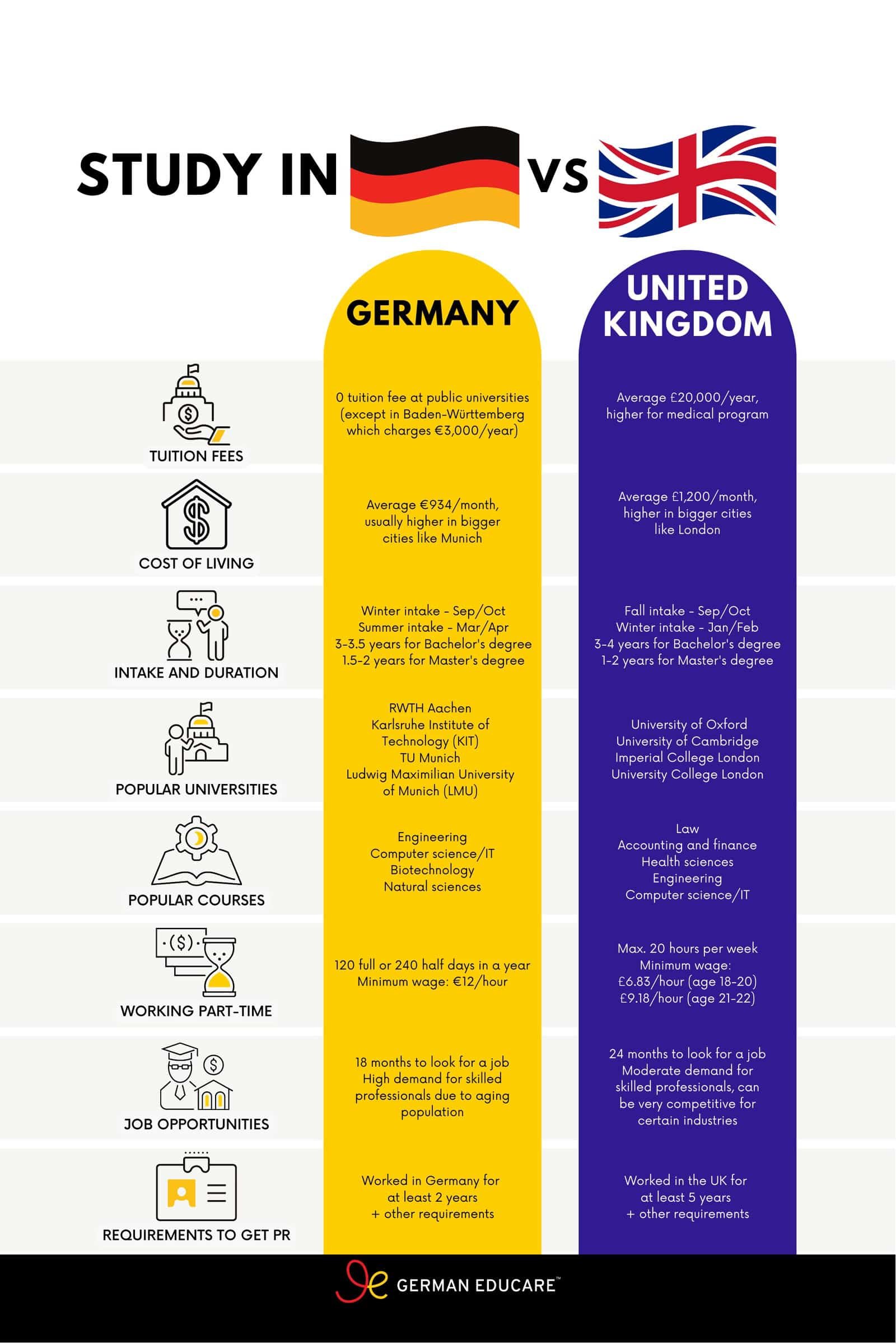Study in Germany vs Study in the UK
Estimated reading time: 20 minutes
Updated on: Sept 2025

Key Takeaways
- Tuition fees in Germany are much lower compared to the UK, with many programmes being free or involving only small fees. In contrast, tuition fees in the UK are generally higher, especially for international students.
- Living costs in Germany are more affordable, offering lower accommodation and daily expenses. The UK, particularly cities like London, is known for its higher cost of living.
- German universities are highly regarded in engineering and technical fields, while the UK is renowned for its strong academic reputation in business, law, and social sciences, with institutions like Oxford and Cambridge leading the way.
- Germany provides excellent job opportunities, especially in engineering and IT, while the UK offers a Graduate Route visa that allows post-graduation work but has a more competitive job market.
- Germany offers more job opportunities, making it more possible to stay on long-term compared to the UK.
- Choosing between Germany and the UK depends on your priorities.
- If you seek affordable education and solid job prospects in technical fields, Germany may be the better choice. On the other hand, if you value prestigious universities and a multicultural experience, the UK could be more appealing.
Studying abroad is a dream for many, and it’s easy to see why. Picture this: experiencing all four seasons, sipping hot chocolate while snowflakes fall softly in winter, cycling along a serene stream on your way to campus, or curling up with a book surrounded by vibrant autumn leaves. For most of us, the idea of university life comes from those charming scenes in Hollywood movies or Netflix shows.
When it comes to studying overseas, the UK has long been a top choice for Malaysian students. It’s no surprise, really – the UK is home to some of the world’s most prestigious universities like the University of Oxford and the University of Cambridge. Plus, many of us have friends or family there, so we often hear about life and studying in the UK firsthand.
On the other hand, countries like France, Japan, and Germany are a bit under the radar for most Malaysian students. Because of this, not many people realize that Germany is a leading hub for engineering, offering excellent opportunities for students interested in engineering or Industry 4.0 courses. What’s even more surprising? You can study tuition-free at most public universities in Germany!
If you’re thinking to yourself, “Should I study in the UK?” or “Should I study in Germany?”, we’ve put together a breakdown of the key differences between the two. Hopefully, this will help you make a well-informed decision about which study destination is the best fit for you. Let’s dive in!
Germany vs the UK: Which is the Better Choice for Studying?
Both countries offer world-class education, but understanding the differences can help you make an informed choice.
Tuition Fees: A Huge Difference
Germany offers a fantastic benefit: tuition-free education at public universities. Only one state, Baden-Württemberg, charges a low fee of €1,500 (RM7,000) per semester.
In contrast, the UK can be expensive. International students pay anywhere from £10,000 to £20,000 (RM56,000-RM112,000) per year for undergraduate studies. Medical programs can cost up to £38,000 (RM215,000) annually. Plus, you’ll need to budget for multiple years of fees, depending on your course.
Cost of Living: Germany Offers Better Value
Germany’s monthly living costs average around €992 (RM4,610). In larger cities like Munich or Hamburg, cost of living can be as high as €1,400 (RM6,500).
In the UK, living expenses can be higher, especially in London. The average monthly cost there is £1,260 (RM7,300). Outside of London, living costs drop to £920 (RM5,160).
Intakes and Duration of Studies
Germany offers two intakes each year: winter (September/October) and summer (March/April). A bachelor’s degree typically takes 3 to 3.5 years to complete. Master’s programs take about 1.5 to 2 years.
The UK also has two main intakes: fall (September/October) and winter (January/February). Some universities offer an April/May intake, but it’s less common. A bachelor’s degree in the UK usually takes 3 to 4 years, while a master’s lasts 1 to 2 years.
Popular Universities: Germany’s Engineering Excellence vs. UK’s Academic Legacy
Germany is known for its engineering programs, especially through the TU9 universities, which include the prestigious RWTH Aachen and Technical University of Munich. They have excellent academic reputations with strong industry ties.
List of TU9 universities:
- RWTH Aachen
- Technical University of Berlin
- Technical University of Braunschweig
- Technical University of Darmstadt
- Technical University of Dresden
- Leibniz University Hannover
- Karlsruhe Institute of Technology
- Technical University of Munich
- University of Stuttgart
The UK is home to some of the world’s top universities, like the University of Oxford and University of Cambridge. These institutions are known for their academic rigor and prestige.
According to the QS World Universities Ranking 2025, the top 10 universities in the UK are:
- Imperial College London
- University of Oxford
- University of Cambridge
- UCL
- The University of Edinburgh
- The University of Manchester
- King’s College London
- The London School of Economics and Political Sciences
- University of Bristol
- The University of Warwick
Popular Courses
Germany is a leader in fields like engineering, and computer science, especially as the pioneer of Industry 4.0. If you’re interested in IT, cybersecurity, or AI, Germany is a great choice.
The UK is famous for courses in law, medicine, accounting and economics. Students who graduate in fields like law or accounting from the UK can easily practice in Malaysia.
Working Part-time
In Germany, international students can work up to 140 full days or 280 half-days per year. Jobs can range from tutoring to retail or even on-campus roles like research assistants. The minimum wage for part-time work is €12.82 per hour.
In the UK, students can work 20 hours per week during term time and full-time during breaks. The minimum wage ranges from £10 per hour (for 18 to 20) to £12.21 per hour (for 21 and over).
In Germany, there’s this term called “working student,” and it’s pretty much what it sounds like. A working student is someone who has a part-time job that’s connected to their field of study. It’s a great way for students to put what they’re learning in class into practice, while also gaining real-world experience, building important professional skills, and growing their network. These opportunities can really set them up for success when it comes to their future career.
Job Opportunities After Graduation: The Path to Stay
Germany offers a post-graduation residency option. Graduates can stay for up to 18 months to search for work. Once employed in a field related to their studies, they can apply for an EU Blue Card to live and work in Germany.
In the UK, graduates can now stay for up to two years under the new Graduate Route. This is great news, as opportunities for international students to stay after graduation were once limited.
Permanent Residency: A Longer Road in the UK
If you want to live permanently in Germany, you can apply for a settlement permit after working for 21 months under the EU Blue Card, provided you meet all other requirements, including German language skills.
In the UK, it takes at least five years to apply for permanent residency. You’ll need stable employment and proof of good conduct.
How competitive is it to get into universities in Germany vs the UK?
Germany has a rigorous admission process, especially for non-EU students who may need to prove their German language proficiency for undergraduate programs. However, Germany’s universities are known for their high academic standards and focus on research and technical fields.
The UK has a highly competitive university system, particularly for top universities like Oxford and Cambridge. Admission is based on academic performance and standardized testing, and some universities may require a higher proficiency in English.
Making the Final Decision: Should I choose Germany or the UK?
- If you’re looking for an affordable education with excellent job prospects in technical fields, Germany is likely the better choice.
- If you’re interested in studying accounting or economics, the UK may be more suitable.
How to Study in Germany?
German Educare can guide you through the entire process of studying in Germany, from choosing the right university and program to assisting with visa applications and accommodation arrangements.
As experts in German education, we provide University Preparation Programmes, personalised advice and support, ensuring you meet all the requirements for a successful application. With a strong network of partner universities and a deep understanding of the German education system, we’ve helped thousands of students navigate the complexities of studying abroad, making your transition to life in Germany smooth and stress-free.
FAQ
Which country is better for international students: Germany or the UK?
Both Germany and the UK offer excellent opportunities for international students, but the best choice depends on your priorities. Germany offers low tuition fees and a strong economy with plenty of post-graduation job opportunities, especially in fields like engineering and IT.
On the other hand, the UK has prestigious universities, a global network, and more immediate post-graduation work opportunities through the Graduate Route visa
What are the top universities in Germany and the UK?
In Germany, some of the top universities include RWTH Aachen and TU Braunschweig, known for their strong focus on research, particularly in engineering, natural sciences, and computer science.
In the UK, universities such as Oxford, Cambridge, Imperial College London, and the London School of Economics (LSE) are globally renowned for their academic excellence, especially in fields like business, law, and social sciences.
Are there any specific entrance requirements to study in Germany or the UK?
For Germany, undergraduate students typically need a recognised pre-university qualification and may need to demonstrate proficiency in German for programs in that language, although many postgraduate courses are in English. Proof of financial support is also required.
In the UK, students must meet specific A Level requirements for undergraduate courses, and postgraduate courses require a Bachelor’s degree. Universities like Oxford and Cambridge may require additional documentation, such as personal statements and interviews.
What is the social life like for international students in Germany and the UK?
In Germany, international students enjoy a dynamic social life with cultural events, festivals, student-run clubs and outdoor/nature activities. Additionally, cities like Berlin and Munich are known for their vibrant arts and cultural scenes.
The UK offers a similarly rich social life, especially in cities like London and Manchester, where students can participate in a wide range of societies, events, and activities. The UK’s multicultural environment provides a unique social experience for international students.
Which is colder, Germany or the UK?
Germany experiences a temperate climate with cold winters and mild summers, especially in cities like Munich and Berlin, where snowfall is common in winter.
In contrast, the UK has a mild, temperate climate with cooler summers and milder winters. The weather is more unpredictable in the UK, with frequent rainfall across most regions, particularly in London and Manchester.
Conclusion: Make Your Decision Based on Your Goals
Germany and the UK offer distinct benefits. If you’re looking for affordable education, high-quality engineering programs, and easy access to job opportunities, Germany is a top choice. On the other hand, the UK offers prestigious universities and a wide range of courses.
What matters most is your long-term goal. Are you ready to embrace the affordability and innovation in Germany, or does the UK’s academic prestige appeal more to you? Your decision will shape your future.

You might also like

Article title

Article title
